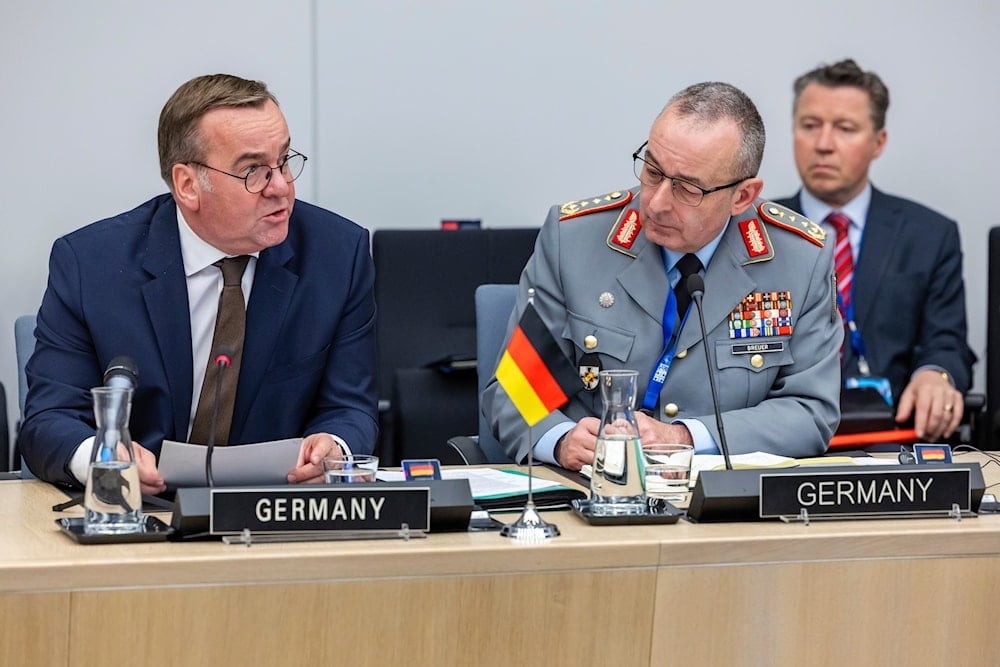German defense chief commands fast expansion of warfare capabilities
Germany plans full military readiness by 2029, driven by NATO priorities and fears of a resurgent Russia.
-

Germany's Defense Minister Boris Pistorius, left, talks as he sits next to German Chief of Defense Carsten Breuer during a meeting at NATO headquarters in Brussels, Friday, April 11, 2025 (AP)
Germany's Chief of Defense, Carsten Breuer, has ordered the German military to be fully equipped with weapons and other material by 2029, according to a document seen by Reuters on Sunday.
The latest document, titled "Directive Priorities for the Bolstering of Readiness" and signed by Breuer on May 19, stated that Germany would achieve this goal using funds made available after the loosening of the country's debt brake in March.
Priorities outlined
In the directive, Breuer outlines priorities for the most urgently needed weapons acquisitions and developments, which partly align with NATO's previously established goals, including the reinforcement of Germany's depleted air defenses, particularly to enhance capabilities for intercepting drones.
The document also highlights another key priority: developing the capability to conduct deep precision strikes, enabling effective engagement of targets beyond 500 kilometers (310 miles) and deep within enemy territory.
The directive further emphasizes replenishing Germany's ammunition stocks while also calling for increased stockpiling targets across all ammunition types, in addition to prioritizing the rapid expansion of electronic warfare capabilities and the development of a robust space-based system integrating both offensive and defensive capabilities.
Why 2029?
According to assessments by Breuer and other senior NATO military officials, Russia could potentially rebuild its military strength by 2029 to a level enabling attacks on NATO territory.
In a mid-May speech, Army Chief Alfons Mais warned that Russia's large-scale social and industrial mobilization is rapidly boosting its military firepower, suggesting that while Russian forces could be capable of launching a full-scale conventional attack on NATO territory by 2029 at the latest, they might begin testing NATO's defenses much sooner.
This comes as Germany looks into strengthening its defense under its new Chancellor, Friedrich Merz, mulling reinstating conscription laws, and building new alliances with European partners.
Germany moves to bolster defence under Merz
On May 15, Defense Minister Boris Pistorius stated that Germany might need to reinstate mandatory military service if voluntary enlistment fails to meet the armed forces' personnel requirements.
Broadcaster N-tv reported that the Social Democrats and Chancellor Friedrich Merz's Christian Democrats reached an agreement in their coalition deal to implement the "Swedish model", a hybrid system incorporating both selective compulsory military service and voluntary enlistment options.
"We have agreed that we will initially rely on voluntarism – a service that is initially voluntary and intended to encourage young people to serve their country," Pistorius told the Bundestag in a May 14 address.
France, Germany set to form security council
Germany and France pledged to strengthen defense cooperation during Chancellor Friedrich Merz's first official visit to Paris on May 7, where he met with President Emmanuel Macron.
"We will set up a French-German defense and security council to meet regularly to bring operational responses to our common strategic challenges," Macron stated during a joint press conference.
"We will take joint measures to further enhance Europe's security and defence capabilities," Merz stated before heading to Poland later on the same day.

 3 Min Read
3 Min Read









